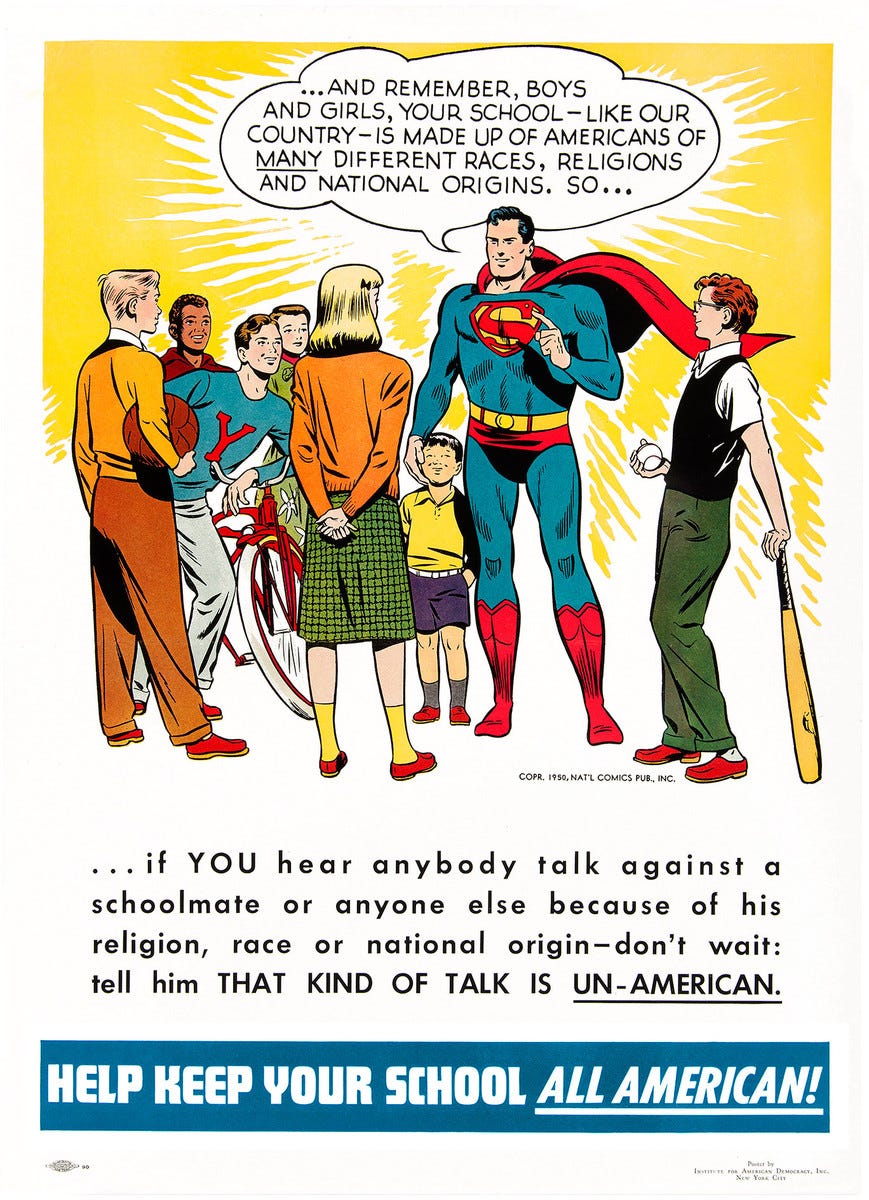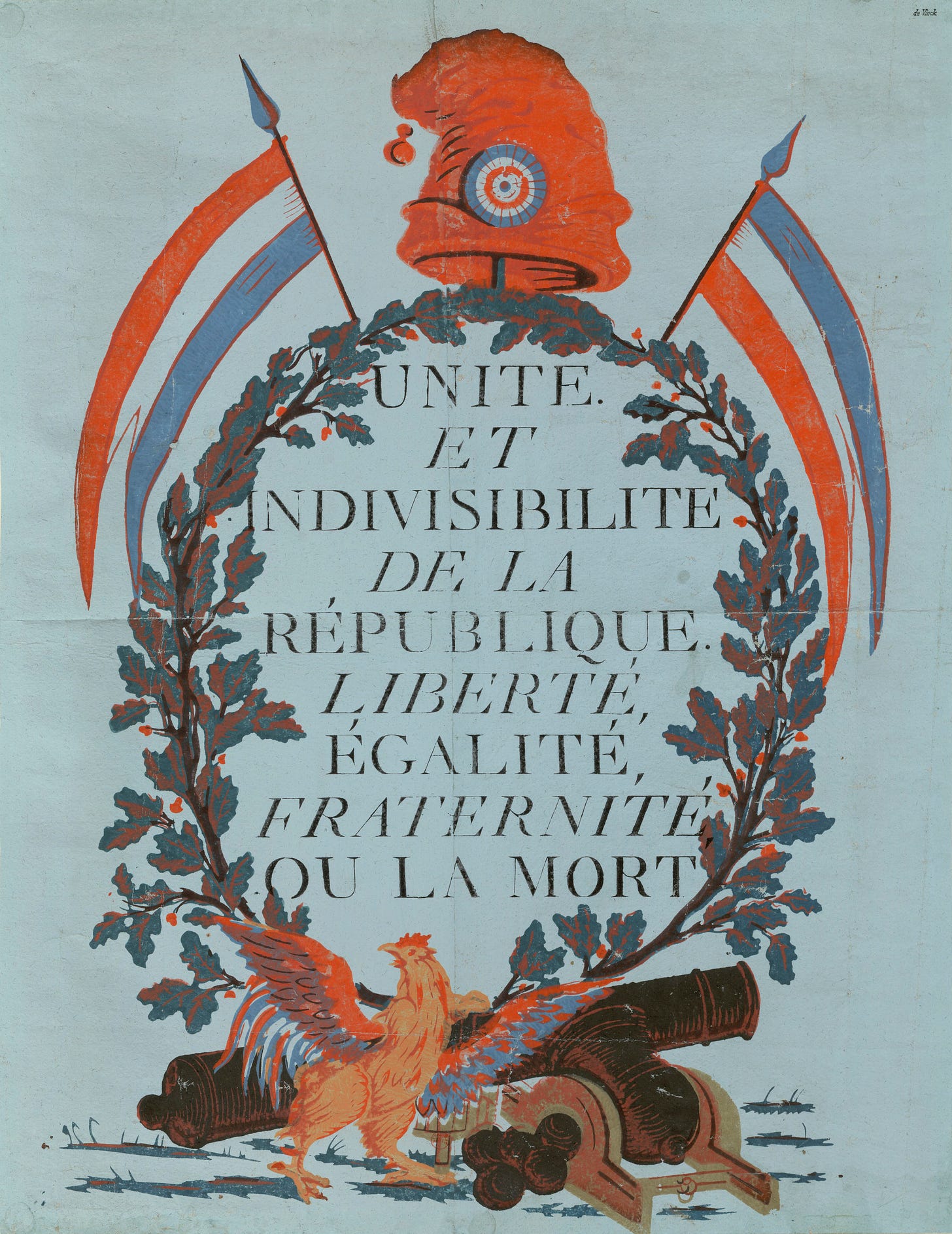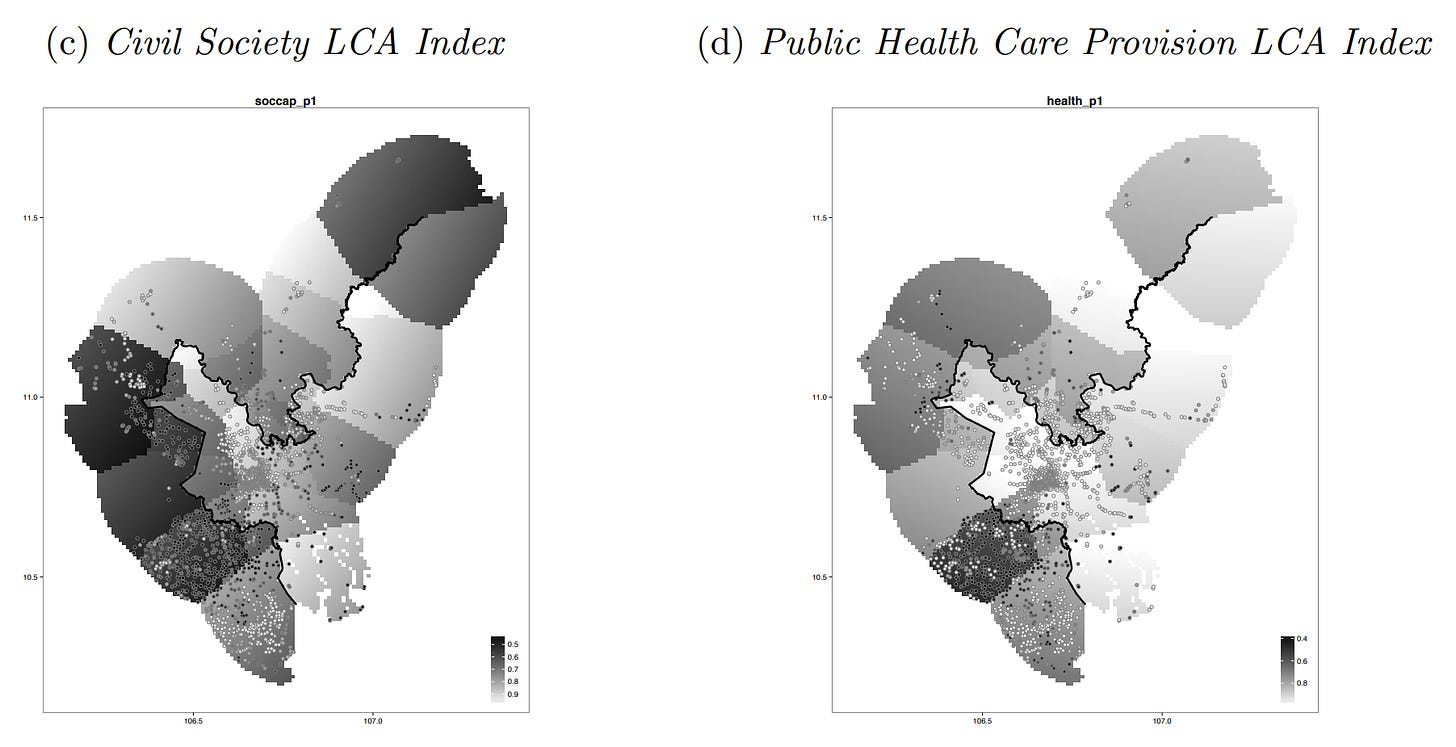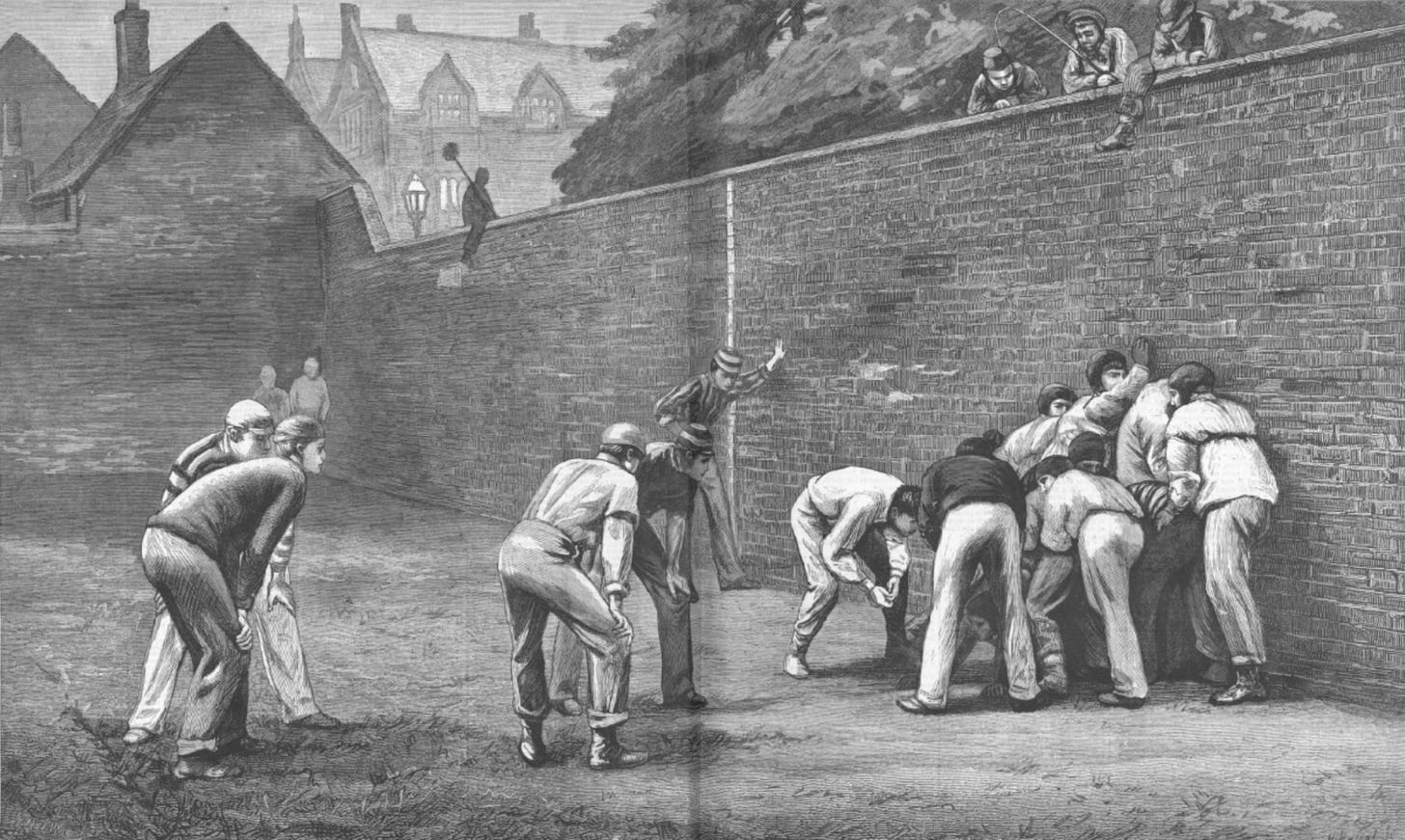Manufacturing Communities with Imagined Consent: Part II
The three historical monuments of society are the citadel, market and altar.
Last time, we agreed we want to scale up trust!
Three methods of social organisation come to mind. Each replaces tribal kinships and holds the natural Molochian strife at bay in its own way.
VI.
The first are polities. Instead of relying on localised reputations, we rely on artificial group identities. These create communal norms, or what Durkheim called “social facts”. Rationally, you might see this faith in the polity as misplaced, since you can’t observe someone on the other side of the country. But it is this Socratic “noble lie” which lets us mobilise collective resources for the sake of individual prosperity.
Indeed, the fundamental question of political economy is about this: how we can maintain a collective illusion that people are ready and willing not just to sacrifice for, but to die for?
For this identity to serve our purposes, it has to do three things:
Demarcate who is in the ingroup and who is in the outgroup.
Explain why the ingroup is more deserving of our moral consideration.
Do so with the minimal degree of exclusion needed for 1 and 2.
Obviously, there’s no point in making it deliberately harder to opt into an identity than required. Exclusion for exclusion’s sake is bad, and we try and temper this with condition 3. But 1 and 2 necessarily imply that the identity must be exclusionary to some degree. Why is that?
VII.
There’s a principled reason and a practical reason.
The principled claim comes from the fact that an identity can be seen as a collection of members with some common properties. Then in a trivial set-theoretic sense, an identity must be exclusionary to mean anything; without some defining traits, it is just the universal set of all members.
But there’s a practical reason too. We’ve framed identities in the context of inducing altruistic and cooperative behaviour. We might expect that – in this bellum omnium contra omnes – individuals who are selfless will get outcompeted by selfish individuals, because the latter will be solely optimising for their own reproductive success.
However, Darwinian evolutionary pressures operate on multiple levels. As David Wilson and Edward Wilson put it1:
Selfishness beats altruism within groups. Altruistic groups beat selfish groups. Everything else is commentary.
On the face of it, this doesn’t seem like much. Even if cooperative communities are more successful, wouldn’t they unravel as people started defecting within those communities? Luckily, this can be remedied if interactions are not random. Instead, they could be correlated, whereby people who are cooperative are more likely to interact with each other; they could be settling in similar places, sending signals to identify each other or associating with each other via networks.
Formally, this can be described by Hamilton’s rule, which says that the proliferation of a gene depends on the genetic relatedness of the two individuals r, the indirect benefits to fitness of altruism B and the costs of facing defection C.
rB > C
So although within-group selection may work against the “cooperative gene”, between-group selection works in its favour; the outcome depends on the relative strengths of these effects. Thus it is unsurprising that collective identities have to be exclusionary, because that raises r and ensures that mutually beneficial interactions are more frequent. In those environments, cooperation is an evolutionarily stable strategy.
VIII.
Empirically, this idea that cooperative choices involving personal sacrifice require a degree of homogeneity is plausible. In communities with more ethnic diversity, there’s often less spending on public goods, both in the USA2 and beyond3. But this is not an argument for having no diversity at all.
There are definite benefits to diversity from the point of view of evolutionary success. For example, a population with more heterogeneous traits will be more likely to have the trait that ends up being important for advancing the technological possibilities. But given heterogeneity could reduce cooperation, what we find is that there is a hump-shaped relationship between diversity and development4.
Thus we’re left with this Copenhagen interpretation of communities, with its own wave-particle duality and its own indeterminacy. Communities are both waves of identities and particles of people. And the more inclusive an identity is, the less coherent its people are.
So what is the optimal exclusionary identity given this trade-off?
A few lines of demarcation clearly suck: religion, ethnicity, sex etc. They are needlessly exclusionary, and bloody hard to opt into. But nationalism seems like a shout. Like all identities, it is of course exclusionary. But unlike the previous ones, it is possible for anyone to opt into the identity because it is dependent – not on immutable characteristics – but on shibboleths which are pretty accessible:
As Benedict Anderson puts it:
I propose the following definition of the nation: it is an imagined political community.
You simply need to subscribe to the values and existence of the state to be a participant in its national identity. And those values are public and subject to vigorous debate, rather than being some amorphous ingroup signifier or litmus test.
IX.
There’s also a more substantive reason why national identity is important. Those Brexiteers who demanded “sovereignty” – the ones who liberals sneered at – made an underappreciated point: that the collective identity has to be at the same organisational level as the polity. In his 1983 Nations and Nationalism, Ernest Gellner describes it as follows:
A political principle that holds that the political and the national unit should be congruent
Suppose the collective identity is larger than the polity. Then we are being asked for our allegience to people who do not partake in our collective sacrifice. That feels like a swindle! And if the collective identity is smaller than the polity, our loyalties lie away from the state, delegitimising it and causing us to retreat into enclaves.
But if a salient national identity overlaps exactly with the polity, it actually raises trust and reduces tensions between smaller groups5. As the French revolutionaries recognised, the thing which aligns our liberty to do what we want with the equality we seek in society is fraternity, and that’s exactly what this sense of sovereignty provides.
Now some think we can do one better and make an identity out of cosmopolitanism. I used to be one of those people, and I so desperately wish they were right – but they just aren’t. Unfortunately, we don’t live in a world where we can sit around a campfire and sing kumbaya.
The essential problem is that when the engines of prosperity stall, cooperative behaviour becomes a lot less rewarding and people are more sensitive to perceived defectors. And if there’s an iron law of politics, it’s that as soon as the strategic interactions become competitive, everyone is forced to play dirty.
And so every time this has been tried, these cosmopolitan societies have eventually become easy prey for a less morally scrupulous actor to exploit. After all, cosmopolitanism refuses to declare an outgroup, and an identity which is engaged in this perpetual self-subversion cannot survive for long.
There is no dearth of opportunistic populists who have been willing to capitalise on that and shrink the ingroup. Examples abound: Reagan’s so-called “welfare queens”, Romney’s 47% or Chirac’s le bruit et l’odeur; the rise of the fifth estate – though it undoubtedly reduced collusive gatekeeping between the political and media elites – has also accelerated this race to the bottom. So the backlash always sets in before the cosmopolitanism takes root. Nationalism remains the best we can do in this second-best world.
X.
To make matters worse for the cosmopolitans, the moral case against nationstates is a tad lacking. It usually relies on the birth lottery argument. Because it is arbitrary where we are born, no moral significance can be ascribed based on that. So countries owe moral duties to everyone in the world, not just their citizens.
This is just utter bollocks. It is perfectly arbitrary which particular sperm impregnates the egg; that doesn’t mean parents owe no moral duties to their children. Given how much governments coerce and command us, it seems likely they owe their citizens special duties in return. Nor is it the case that loving one’s country make you bigoted. Certainly no more so than how loving and prioritising one’s spouse makes you bigoted against other people.
At this point, my fellow liberals might be outraged. Doesn’t this disrespect every tenet of atomic individualism which liberalism espouses? I say yes. To wit, viewing the individual as the default is a deeply chronocentric fallacy. It was an invention of the Enlightenment – in other words, a historical accident rather than some deep fact about human nature.
XI.
Let’s move on to the second method of social organisation: fiat money.
How did pieces of paper with numbers on them become the linchpin of commerce? It certainly didn’t start that way. In The Gift, Marcel Mauss notes that primitive humans tended to organise themselves into gift economies; informal reciprocal obligations sufficed for organising trade.
But as societies expanded, we ran into the same issue of scaling trust. It was more difficult to enforce penalties if people broke their promises. Thus it became harder to commit to fulfilling obligations in the future: “evil is the root of all money”6. But this in itself isn’t enough to motivate money just yet.
If we had publicly available transaction histories that could be enforced, we could still trade with credit. So the other problem was that accessible recordkeeping is costly. These two combined to create a need for a standaridised and commensurable debt, meaning “money is [a replacement for societal] memory”7.
Finally, let’s take a look at the third collective hallucination: religion.
It’s easy to see religion as just another trick – much like our last two – to expand our circles of trust. But religion isn’t just another trick. Measured by both its reach and its durability, it’s probably the most successful trick in the history of mankind. Nations rise and fall, currencies come and go, but religions stick around.
So when Rene Girard offers us the following choice, I’m inclined to pick the latter:
There are fundamentally only two ways of looking at religion: as superfluous, added on – or as the origin of everything.
But what is a religion? Is it the gods and the scripture? The services and the festivals? Or perhaps the heretics and the status games? Maybe it’s none of these.
In The Elementary Forms of the Religious Life, Durkheim suggests it is:
A unified system of beliefs and practices relative to sacred things … which unite into one single moral community … all those who adhere to them.
That is, religion isn’t really about the substantive content of all that mythical jazz. Rather, those features are just costly (and so credible) signals) that demonstrate common knowledge in thesacredness of their ingroup.
XII.
Across these three primitives of social organisation, we see three traits prevail.
They are all naturally emergent phenomena.
They are all coordination mechanisms to provide common knowledge and trust at scale.
They are all social contrivances.
Make no mistake – these do not imply some sort of Panglossian panacea. The creation of such artificial yet concretely impactful social constructs is no easy endeavour. That’s because trust is fragile: easy to break and hard to build. The folklore of the past matters for evermore, and communities which punish uncooperative behaviour remain trusting and successful for long after8.
To this day, levels of trust in Africa are heavily influenced by that area’s historical exposure to the slave trade9. Places in Africa where there were conflicts between 1400 and 1700 are more likely to have less trust, more conflict and less of a national identity10. And in Vietnam, places ruled by the Dai Viet administration – which governed more cooperatively at a village level as opposed to the Khmer regime’s top-down patronage-centric approach – still had more redistribution and public goods provision over 150 years later11. The degree of persistence is staggering.
Even once formed, these institutions are not a balm of Gilead against the risk of mistrust unravelling societal cooperation. Just ask Josip Tito, who thought he had managed to suppress sectarian divides in Yugoslavia with a more inclusive national identity. And for a while, he did – until he didn’t. So when he died, the country exploded into sectarian violence and eventually disintegrated entirely.
Because the social capital which they generate is not a widow’s cruse, it can be exhausted. And it must be renewed by moments of Durkheimite “collective effervescence”, where people come together to participate in the same narrativees and practices.
Empirically, the effect of these rituals are large. For example, American religious communes in the 19th century were half as likely to collapse in their first 5 years and had an average lifespan which was four times as long as their secular counterparts12. And crucially, the greater longevity was a direct consequence of those rituals being costly impositions on members13.
XIII.
I think a big part of why all of this works is because they require people to physically interact. In fact, each of these three primitives has a corresponding physical analogue. The citadel lets people gather when they need to defend their borders and boundaries. The market is the embodiment of impersonal monetary exchange writ large. And upon the altar – the quintessential holy ground – is where we make the immanent sacred.
More anecdotally, I think sports are a good example of how you can get swept up in this sense of comraderie by being physically present for these rituals. As a rule, I’m not terribly invested in sports. But I nonetheless went back to my old school a few months ago, solely to cheer on my boarding house at the annual Wall Game match.
The details of what Wall Game is are irrelevant, and frankly I’m not sure even the players really know how it’s played. What you do need to know is that the annual game is played between the 1 boarding house for academic scholars (called Collegers) and the 24 boarding houses for non-scholars (called Oppidans).
That means once a year, for an hour on a rainy Saturday in November, you can hear 70 incredibly nerdy teenage boys trying to outshout 1,200 of their slightly-less-nerdy compatriots with repurposed football chants. And this collective effervescence works; certainly well enough that I’ve seen Collegers who graduated years ago make the pilgrimage back for this annual event.
The reason it works is because it has all the trappings of a religion. There is a PDF full of chants (scripture). There is a day dedicated to the game (festival). And every Christmas supper, the College Wall Game team toasts to Logie Colin Leggatt, a former Colleger who died at the Battle of Passchendale wearing his purple-and-white house scarf (martyr and service).
So where’s this pseudo-religious fervour in the modern era? Find out how next time!







